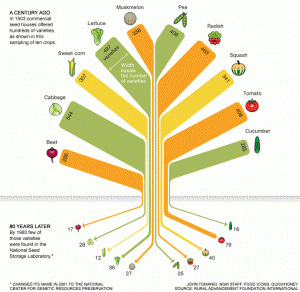The Demise of Biodiversity
I come from a family of amateur farmers. For as long as I can remember, my backyard in New Jersey has been filled with several types of cucumber, tomato, hot peppers, basil and lettuce plants, all courtesy of the tender ministrations of my grandfather and father. Growing up around such a variety of fresh foods has naturally made me a foodie. My innate love for food has caused me to learn as much as I can about it – whether it be reading an article of agricultural development, or simply perusing one of my favorite recipe websites. Most recently, I was surprised to learn that out of the hundreds of varieties of produce that existed a scant 100 years ago, only a handful of them are grown on farms today. It’s estimated that about 75% of the world’s crop varieties have already disappeared. What has led to this loss of biodiversity, you ask? Well, much of this loss can be attributed to the focus on monocrops.
reading an article of agricultural development, or simply perusing one of my favorite recipe websites. Most recently, I was surprised to learn that out of the hundreds of varieties of produce that existed a scant 100 years ago, only a handful of them are grown on farms today. It’s estimated that about 75% of the world’s crop varieties have already disappeared. What has led to this loss of biodiversity, you ask? Well, much of this loss can be attributed to the focus on monocrops.
My fellow intern Julia has written several posts on the dangers of king crops and production of biofuel. Not only are monocrops damaging to the environment, but these crop varieties are also a form of bad, unsustainable agriculture that impacts our present and future access to food. With poverty and food crises already affecting countries throughout the world, focus on monocrops is drastically reducing biodiversity and plays a role in the potential for a food shortage to hit the USA. This focus on monocrops arose primarily during the Green Revolution in the 1960s with the goal of spreading mass cultivation of specific varieties of high-yielding crops (e.g. corn and wheat) to developing countries as a way of combating famine. While this was initially a positive endeavor, the monocropping strategy has actually made our future less secure.
As time went on, farmers began to rely more and more on the adapted high-yield crops that were introduced to them, and began to stop cultivating local crop varieties. While this monocropping greatly increased the harvest and began to feed more people, these uniform crop varieties are also genetically weaker crops in comparison to traditional farming, and are not only more susceptible to disease but in constant need of chemicals and pesticides to grow. This pushing out of local crop varieties has greatly reduced biodiversity and resulted in a permanent loss of what were very valuable genetic traits. For thousands of years, farmers had developed food crops suited to their local environment. Each crop was suited for a specific problem in a specific place. Unfortunately, we have now become entirely dependent on these monocrops to feed ourselves, and in the near future might desperately need one of the varieties we’ve allowed to go extinct.
A prime example of this, is the world’s current fear of the decimation of wheat crops. Ug99 (named because first discovered in Uganda in 1999) is a fungus that affects wheat crops and is quickly spreading across the globe. In the past few years it has spread throughout countries in Africa and even made it to Iran. Scientists are predicting that it’s only a matter of time before Ug99 makes it to India, China and Russia. There is also the fear that this fungus will also eventually hit US wheat crops. It’s estimated that about 90% of the world’s wheat is defenseless against Ug99. If it continues to spread and we do nothing about it, about 1 billion people in Africa and Asia would be left without their primary food source. And if it spreads to the USA, about $1 billion of wheat would be lost.
In short, our focus on increasing the amount of food via monocrops has put us at high risk for food shortages in the near future. Instead of adapting seeds to local conditions, we’ve resorted to adapting farms to the seeds of genetically uniform crops, which are also genetically weak. It’s imperative that we begin cultivating the crops that we had originally developed to not only reintroduce variety in our crops, but also as a way to combat the potential hazards that environmental changes will have on our current monocrops. If we introduce biodiversity back into our food and return to traditional methods of farming that allow for the cultivation of a variety of crops on farmland, this could greatly reduce the crop’s risk to drought or disease, as well as reducing our risk to famine. After all, I’m not sure I could help feed so many people through the small garden variety in my backyard!
Yvonne Chen is a SISGI Group Program and Research Intern. Her focuses are in environmental sustainability, human rights issues, and economic aid in developing countries.


